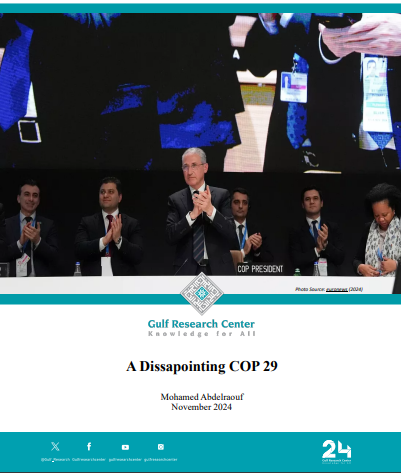
After two weeks of tense negotiations at the 29th Conference of the Parties (COP29) in Baku, Azerbaijan, countries failed to send a strong signal on the need to rapidly reduce emissions and phase out fossil fuels. However, progress was made on the issue of climate finance, as countries managed to reach an agreement that will triple public finance to developing countries, from the previous goal of USD 100 billion annually, to USD 300 billion annually by 2035.
Many still see this as a failure for COP 29 as many developing countries and climate activists were expecting to raise funding into the trillions in order to push global efforts further in tackling the climate crisis and provide necessary funding for developing countries and vulnerable communities. Climate experts and activists were expecting the New Collective Quantified Goal (NCQG) on climate finance to scale up financing to developing countries for climate action from all public and private sources to at least USD 1.3 trillion per year by 2035.
Thus, the final outcome of COP 29 on climate finance goals is seen as too little and too unclear. Concrete pledges by the Global North came only on the last day of the climate negotiations after three years of discussions on this key agenda item. Furthermore, the agreed upon amount will not be sufficient to provide the seed funding for increased mitigation ambitions or adaptation measures.
Although the outcome of COP29 falls far short of hopes and expectations, it does keep climate talks alive. In fact, without this last minute finance deal, there would have been no results at all coming out of this round of climate negotiations in Baku.
COP29 demonstrated the current global challenges of a fragmented and polarized world that seems unable to take joint action. Needless to say, the current global conflicts and political tensions play an important role in bringing climate goals and actions to the forefront where security and economic goals get the most attention, action, and funding.
The New Collective Quantified Goal's success will be judged by whether increased funds reach the communities that need them most, how quickly the funds will be delivered, and most importantly, the form in which they are received (i.e. loans, soft loans, grants, new technology transfer…etc.). In the past, the overwhelming majority of the previous goal of USD 100 billion annually reached developing countries in the form of loans, only adding more burden to these countries, hindering their ability to mitigate climate impacts and achieve development goals.
In addition, countries failed to reach an agreement on how the outcomes of last year’s Global Stocktake, especially its mitigation work program including a key pledge to transition away from fossil fuels, should be taken forward – instead shifting the decision to next year’s COP30 in Brazil.
In fact, COP30 represents a critical milestone, marking the deadline for countries to submit new Nationally Determined Contributions (NDCs), which serve as high-level roadmaps for national climate action in order to meet the Paris Agreement climate goals.
On a positive note, progress to 'further operationalize the Fund for Responding to Loss and Damage,' which was agreed in the previous COP27 and COP28, has been a welcome step forward. Furthermore, COP29 saw an agreement reached on carbon markets – which several previous COPs had not been able to achieve. This agreement will help countries deliver their climate plans more quickly and affordably, as well as make faster progress in halving global emissions in this decade. There is no doubt that the world still has a very long way to go to overcome climate crisis, but at the very least, COP 29 was another step in the right direction.
*Dr. Abdelraouf is the Director of the Environmental Security and Sustainability Research Program at the Gulf Research Center.

